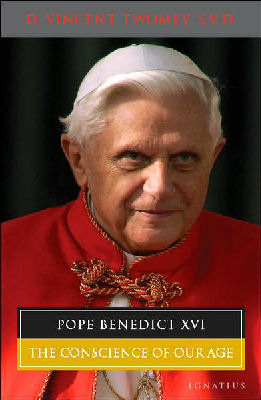
|
November 28, 2007
Book: Pope Benedict XVI: The Conscience of our age — A Theological Portrait Author: D. Vincent Twomey, S.V.D. Ignatius Press. San Francisco, CA. 2007. Pp. 202 An Excerpt from the Jacket:
Fr. Twomey offers here a unique double-presentation of the man, Pope Benedict XVI — “a theological portrait” that encompasses both an overview of the writings, teachings and thought of the brilliant theologian and spiritual writer, as well as the man himself, his personality traits, and how he communicates with others. Twomey shows that the Pope’s style is really the opposite of the negative and inaccurate past depictions of Ratzinger. Benedict is indeed very pastoral and will first win the hearts of the people who can then read his writings for themselves. His first encyclical, God is Love, underscores that approach. Twomey also reveals that the secret to Benedict’s serene dignified manner is his openness to beauty and truth. He lives for others and is not preoccupied wit his own self. He is a man that Twomey says “has the courage to be imperfect”, showing he has a deep humility and that he strives for teaching the truth even when he is misunderstood or not properly presented. An Excerpt from the Book: The faith of ordinary Catholics has been shattered by many developments in the Church, not least in the way the liturgy is celebrated. Ratzinger knows that tradition is a living thing. The past cannot be simply “restored” (like some old building) as though nothing had happened in the meantime. Restoration, as advocated by Ratzinger, must of necessity be creative, rooted in theology, and concerned with the essentials, not the accidentals. Our task is to allow a new form of liturgy to emerge organically under the guidance of sound theological priniciples tested in tradition. It should be a form of liturgy that is at the same time “familiar”, a liturgy where people feel at home and yet long for that Home beyond. But it must be a liturgy that, though it transcends all cultures, yet echoes each people’s own culture. Finally, it must be a spiritual liturgy, one that will provide the hope and inspiration we all need in the rough and tumble of everyday life. Table of Contents: 1. The Conscience of the Teacher 2. Ratzinger’s Writings: An Overview 3. The Role of Conscience in Theology 4. The Role of Conscience in Politics 5. What is Conscience Appendix 1 A Critique 6. The German Pope: Guilt by Association 7. The Future under Pope Benedict XVI Epilogue: A Question of Fairness: Critique of a Biography Appendix 2 Sermon by Pope Benedict XVI |
|
